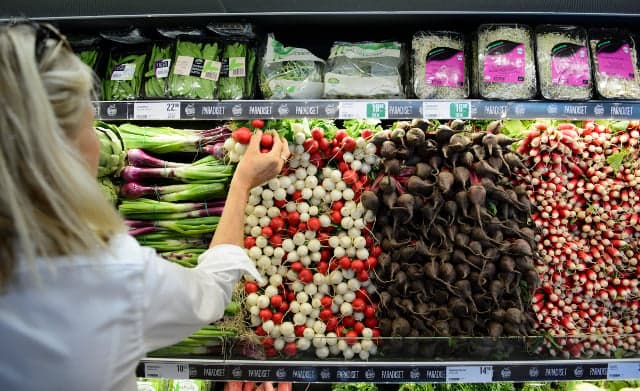Why your food may become more expensive in Sweden

Your grocery bill may be about to take a bigger bite of your income as a result of a tough summer for farmers, the Swedish food industry warns.
Sweden's unprecedented heatwave this summer caused forests to burn, fields of crops to dry out and some farmers had to send their livestock to early slaughter because they could not feed them.
This is now having knock-on effects for producers and consumers, the Swedish Food Federation, a national organization representing companies and employers in the food industry, warns in a new report.
The cost of raw materials has already increased by 40 percent for some of its members, a large number of whom predict that costs will increase further this autumn and next spring, according to the report. This includes everything from bakeries and breweries to producers of dairy, pasta, cereals and meat.
"We're entering a period of soaring costs," said chief economist Carl Eckerdal.
Around 60 percent of processed food in the Swedish food industry comes from Swedish agricultural raw materials, which means that when companies have to hold back or can't find domestic food products, there is a risk that the supply on supermarket shelves won't meet consumer demand.
"We will end up in a situation where we have to consider whether we should import raw materials. What happens to the labelling then? Such a change would be incredibly expensive, if it's even a road we want to go down, because we don't want to experiment with customers' trust in us," said Eckerdal.
The Food Federation argues that the problems caused by the summer drought could be compared with the global raw food material crisis of 2007-2009 which, exacerbated by the financial crisis, saw the price of goods such as maize and soy products soar. In some cases the price even tripled.
"What we saw at the time was that the companies' gross margin collapsed like a souffle. And the prices in stores were not able to compensate for this huge increase in costs," said Eckerdal.
He expects costs for grocers to rise further around the turn of the year, and hopes that there will be a willingness from consumers to dig deeper into their wallets to help compensate for the losses.
"If we face the same response now (as in 2007-2009), that there is a low willingness to pay, then some companies will be close to the limit of where they will not be able to continue to operate."
Comments
See Also
Sweden's unprecedented heatwave this summer caused forests to burn, fields of crops to dry out and some farmers had to send their livestock to early slaughter because they could not feed them.
This is now having knock-on effects for producers and consumers, the Swedish Food Federation, a national organization representing companies and employers in the food industry, warns in a new report.
The cost of raw materials has already increased by 40 percent for some of its members, a large number of whom predict that costs will increase further this autumn and next spring, according to the report. This includes everything from bakeries and breweries to producers of dairy, pasta, cereals and meat.
"We're entering a period of soaring costs," said chief economist Carl Eckerdal.
Around 60 percent of processed food in the Swedish food industry comes from Swedish agricultural raw materials, which means that when companies have to hold back or can't find domestic food products, there is a risk that the supply on supermarket shelves won't meet consumer demand.
"We will end up in a situation where we have to consider whether we should import raw materials. What happens to the labelling then? Such a change would be incredibly expensive, if it's even a road we want to go down, because we don't want to experiment with customers' trust in us," said Eckerdal.
The Food Federation argues that the problems caused by the summer drought could be compared with the global raw food material crisis of 2007-2009 which, exacerbated by the financial crisis, saw the price of goods such as maize and soy products soar. In some cases the price even tripled.
"What we saw at the time was that the companies' gross margin collapsed like a souffle. And the prices in stores were not able to compensate for this huge increase in costs," said Eckerdal.
He expects costs for grocers to rise further around the turn of the year, and hopes that there will be a willingness from consumers to dig deeper into their wallets to help compensate for the losses.
"If we face the same response now (as in 2007-2009), that there is a low willingness to pay, then some companies will be close to the limit of where they will not be able to continue to operate."
Join the conversation in our comments section below. Share your own views and experience and if you have a question or suggestion for our journalists then email us at [email protected].
Please keep comments civil, constructive and on topic – and make sure to read our terms of use before getting involved.
Please log in here to leave a comment.